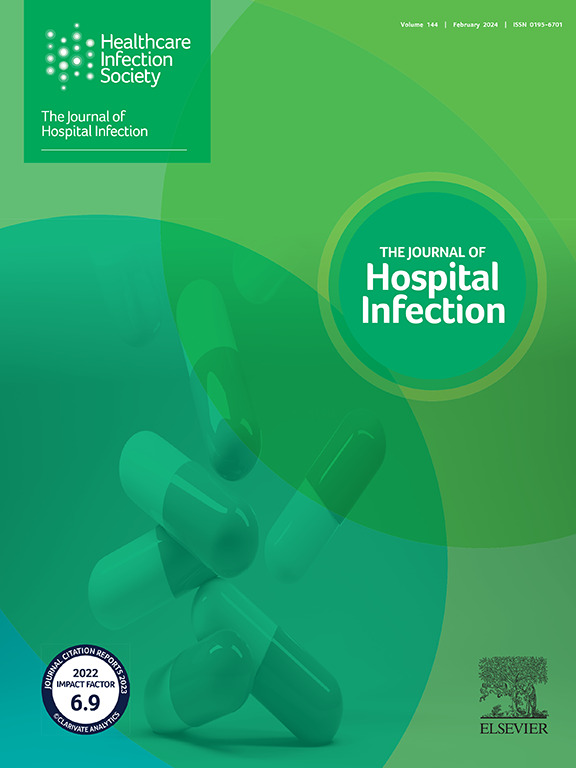Limited impact of colistin resistance on mortality of intensive care patients with carbapenem-resistant bacteraemia
IF 3.9
3区 医学
Q1 INFECTIOUS DISEASES
引用次数: 0
Abstract
Background
Increasing incidence of carbapenem-resistant Gram-negative bacteraemia (CR-GNB) has triggered increased use of polymyxins, likely fuelling the emergence and spread of colistin resistance.
Aim
To estimate the excess clinical burden of colistin resistance in intensive care patients with CR-GNB.
Methods
A cohort of patients with CR-GNB during their stay in the intensive care unit (ICU) of a university hospital in Greece over a 4-year period (2020–2023) was constructed. Competing risks survival analysis was performed to estimate the burden associated with colistin resistance.
Findings
Of the 177 ICU patients with CR-GNB, 134 (76%) had colistin-resistant isolates, predominantly Acinetobacter baumannii (79%), identified by broth microdilution. Patients with colistin-resistant infection were similar to those with colistin-susceptible infection with respect to age, sex, APACHE II score, Charlson comorbidity index score, Pitt bacteraemia score, prior surgery and the occurrence of polymicrobial cultures. However, patients in the colistin-resistant group had lower risk of mortality compared with those in the colistin-susceptible group (31% vs 44%, P = 0.004 at 14 days, respectively; 46% vs 56% at 28 days, respectively; P = 0.173). Multi-variable regression analysis confirmed that colistin-resistant CR-GNB was associated with significantly lower risk of inpatient death compared with colistin-susceptible CR-GNB within 14 days [cause-specific hazard ratio (csHR) 0.53, 95% CI 0.28–1.01) and 28 days (csHR 0.55, 95% CI 0.31–0.95) of infection onset.
Conclusion
Limited impact of colistin resistance on mortality was demonstrated in a large contemporary cohort of ICU patients with CR-GNB, possibly reflecting the recent shift away from colistin-based treatment regimens.
耐碳青霉烯类菌血症重症监护患者对可乐定耐药性对死亡率的影响有限。
背景:耐碳青霉烯类革兰氏阴性菌血症(CR-GNB)发病率的上升引发了多粘菌素使用量的增加,很可能会助长可乐定耐药性的出现和传播:方法:对在希腊一所大学医院重症监护室(ICU)住院的 CR-GNB 患者建立队列,为期 4 年(2020-2023 年)。研究结果:在177名CR-GNB重症监护病房患者中,发现了3例耐药患者:在 177 例 CR-GNB ICU 患者中,134 例(76%)通过肉汤微量稀释鉴定出耐药菌株,主要是鲍曼不动杆菌(79%)。在年龄、性别、APACHE II 评分、Charlson 合并症指数、Pitt 菌血症评分、既往手术和多微生物培养发生率方面,耐秋水仙碱感染患者与易感秋水仙碱患者相似。不过,与对可乐定敏感的患者相比,对可乐定耐药组患者的死亡风险较低(14 天时分别为 31% 和 44%,P = 0.004;28 天时分别为 46% 和 56%,P = 0.173)。多变量回归分析证实,在感染发生后14天(病因特异性危险比[csHR],0.53;95% CI 0.28 - 1.01)和28天(csHR,0.55;95% CI 0.31 - 0.95),耐受秋水仙碱的CR-GNB与秋水仙碱易感感染相比,住院病人死亡的危险性显著降低:结论:在一个大型当代 ICU CR-GNB 患者队列中,可乐定耐药性对死亡率的影响有限,这可能反映了近来以可乐定为基础的治疗方案的转变。
本文章由计算机程序翻译,如有差异,请以英文原文为准。
求助全文
约1分钟内获得全文
求助全文
来源期刊

Journal of Hospital Infection
医学-传染病学
CiteScore
12.70
自引率
5.80%
发文量
271
审稿时长
19 days
期刊介绍:
The Journal of Hospital Infection is the editorially independent scientific publication of the Healthcare Infection Society. The aim of the Journal is to publish high quality research and information relating to infection prevention and control that is relevant to an international audience.
The Journal welcomes submissions that relate to all aspects of infection prevention and control in healthcare settings. This includes submissions that:
provide new insight into the epidemiology, surveillance, or prevention and control of healthcare-associated infections and antimicrobial resistance in healthcare settings;
provide new insight into cleaning, disinfection and decontamination;
provide new insight into the design of healthcare premises;
describe novel aspects of outbreaks of infection;
throw light on techniques for effective antimicrobial stewardship;
describe novel techniques (laboratory-based or point of care) for the detection of infection or antimicrobial resistance in the healthcare setting, particularly if these can be used to facilitate infection prevention and control;
improve understanding of the motivations of safe healthcare behaviour, or describe techniques for achieving behavioural and cultural change;
improve understanding of the use of IT systems in infection surveillance and prevention and control.
 求助内容:
求助内容: 应助结果提醒方式:
应助结果提醒方式:


